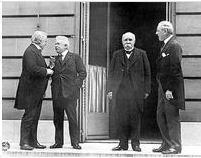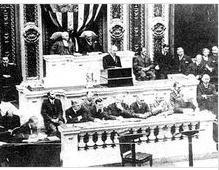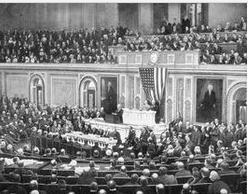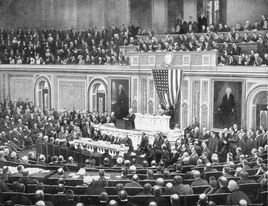十四點原則內容簡介
1918年1月8日,由美國總統威爾遜在國會演講中提出的關於戰後和平解決世界問題的十四點建議,故名。
主要內容:
1. 戰後世界應該是一個開放的世界。
2. 抵制並消除蘇俄布爾什維克主義的影響
3. 要求在給歐洲及近東各民族以自決權的基礎上恢復與建立民族國家,或建立受到列強保護實行門戶開放原則的保護國
4. 成立具有盟約性質的普遍性的國際聯盟,使大小國家都相互保證政治獨立與領土完整。
反映了美國在一戰後希望憑藉強大的經濟實力,在全世界擴張自己的勢力範圍,以民族自決,裁減軍備為幌子,換取世界輿論的支持,削弱英法等競爭對手進而通過建立國際聯盟,在政治上干預與控制戰後世界局勢,參與瓜分世界的殖民地。
 二戰討論
二戰討論因此實際上是美國在戰後企圖衝出美洲,爭奪世界霸權的總綱領。
英文版
I. Open covenants of peace, openly arrived at, after which there shall be no private international understandings of any kind but diplomacy shall proceed always frankly and in the public view.
II. Absolute freedom of navigation upon the seas, outside territorial waters, alike in peace and in war, except as the seas may be closed in whole or in part by international action for the enforcement of international covenants.
III. The removal, so far as possible, of all economic barriers and the establishment of an equality of trade conditions among all the nations consenting to the peace and associating themselves for its maintenance.
IV. Adequate guarantees given and taken that national armaments will be reduced to the lowest point consistent with domestic safety.
V. A free, open-minded, and absolutely impartial adjustment of all colonial claims, based upon a strict observance of the principle that in determining all such questions of sovereignty the interests of the populations concerned must have equal weight with the equitable claims of the government whose title is to be determined.
VI. The evacuation of all Russian territory and such a settlement of all questions affecting Russia as will secure the best and freest cooperation of the other nations of the world in obtaining for her an unhampered and unembarrassed opportunity for the independent determination of her own political development and national policy and assure her of a sincere welcome into the society of free nations under institutions of her own choosing; and, more than a welcome, assistance also of every kind that she may need and may herself desire. The treatment accorded Russia by her sister nations in the months to come will be the acid test of their good will, of their comprehension of her needs as distinguished from their own interests, and of their intelligent and unselfish sympathy.
VII. Belgium, the whole world will agree, must be evacuated and restored, without any attempt to limit the sovereignty which she enjoys in common with all other free nations. No other single act will serve as this will serve to restore confidence among the nations in the laws which they have themselves set and determined for the government of their relations with one another. Without this healing act the whole structure and validity of international law is forever impaired.
VIII. All French territory should be freed and the invaded portions restored, and the wrong done to France by Prussia in 1871 in the matter of Alsace-Lorraine, which has unsettled the peace of the world for nearly fifty years, should be righted, in order that peace may once more be made secure in the interest of all.
IX. A readjustment of the frontiers of Italy should be effected along clearly recognizable lines of nationality.
X. The peoples of Austria-Hungary, whose place among the nations we wish to see safeguarded and assured, should be accorded the freest opportunity to autonomous development.
XI. Rumania, Serbia, and Montenegro should be evacuated; occupied territories restored; Serbia accorded free and secure access to the sea; and the relations of the several Balkan states to one another determined by friendly counsel along historically established lines of allegiance and nationality; and international guarantees of the political and economic independence and territorial integrity of the several Balkan states should be entered into.
XII. The Turkish portion of the present Ottoman Empire should be assured a secure sovereignty, but the other nationalities which are now under Turkish rule should be assured an undoubted security of life and an absolutely unmolested opportunity of autonomous development, and the Dardanelles should be permanently opened as a free passage to the ships and commerce of all nations under international guarantees.
XIII. An independent Polish state should be erected which should include the territories inhabited by indisputably Polish populations, which should be assured a free and secure access to the sea, and whose political and economic independence and territorial integrity should be guaranteed by international covenant.
 十四點原則
十四點原則XIV. A general association of nations must be formed under specific covenants for the purpose of affording mutual guarantees of political independence and territorial integrity to great and small states alike.
中文版
(1)杜絕秘密外交,簽訂公開的契約
(2)確保平時和戰時海上航行的絕對自由
(3)取消一切經濟壁壘,建立貿易平等條件
(4)裁減軍備
(5)公正地處理殖民地問題時,既要顧及到殖民地任命的利益,也應考慮殖民政府的正當要求
(6)外國軍隊撤出俄國,並保證俄國獨立決定其政治發展和國家政策,歡迎它在自己選擇的制度下,進入自由國家的社會。
(7)德軍撤出比利時,並恢復其主權。
(8)德軍撤出法國,阿爾薩斯和洛林歸還法國。
(9)根據民族分布情況,調整義大利疆界。
(10)允許奧匈帝國境內各民族自治。
(11)羅馬尼亞、塞爾維亞和門的內哥羅的領土予以恢復。
(12)承認奧斯曼帝國內的土耳其部分有穩固的主權 ,但土耳其統治的其他民族有在“自治”的基礎上不受干擾的發展機會,達達尼爾海峽在國際保證下永遠開放為自由航道。
(13)重建獨立的擁有出海口的波蘭,以國際條約保證其政治經濟獨立和領土完整。
 十四點原則
十四點原則(14)根據旨在國家不分大小、相互保證政治獨立和領土完整的特別盟約,設立國際聯合機構。
威爾遜十四點原則
一、“十四點原則”提出的經濟、政治背景及其思想來源
1.經濟實力的增強
19世紀末,美國已經成為世界第一經濟大國,其工業生產增長率自19世紀末以來一直保持在5%以上,1900年美國煤、鐵、鋼三項產量全部超過英國,到1913年美國的鋼產量已經是英國的4倍,同年美國機器的產量占世界機器總產量的51.8%。第一次世界大戰後美國掌握了世界黃金儲備的40%以上,使世界金融中心開始從倫敦向華爾街轉移。
2.外交政策的變化
美國自19世紀末以來大力推行門戶開放、大棒政策、金元外交等一系列擴張原則和策略,使得它開始控制加勒比海、中南美洲地區,並在太平洋地區有所擴張,也開始介入歐洲事務。美國參戰後不久,威爾遜政府就開始準備美國的具體戰爭目標與和平
綱領。
3.爭取外交上的主動
列寧的《和平法令》頒布後,威爾遜急於要公布的戰後世界和平計畫,其最主要的一個動機就是回答蘇維埃政權的和平建議,以
便爭取政治上的主動。
4.威爾遜十四點原則有著深刻的思想淵源
(1)美國的傳教士精神或稱之為“天定命運觀”。(2)美國意識形態中的“美國例外論”,美國人有一種與生俱來的優越感,認為美國是“山巔之城”、自由之鄉,是理想世界的縮影。(3)18世紀啟蒙哲學。啟蒙哲學認為,人類是平等的,在國際關係中,人道的目標本身就是國家利益的核心組成部分。
威爾遜的十四點原則在當時引起了巨大的反響。然而,十四點原則基本未能真正實行,例如其核心――國際聯盟,美國並沒有參加。國聯被英法所操縱,成了英法維護自身利益的工具。那么未實現的原因又是什麼呢?
三、十四點原則未能實現的原因
1.理論過於超前
公開外交,公海航行自由,消除經濟壁壘,裁減軍備,實行民族自決等新原則,與支配20世紀上半期國際政治的核心邏輯仍是
民族國家利益、戰爭和力量均勢這些舊世紀的舊原則不相容的。
顯然,用新時代的新的原則去解決舊時代的問題也是行不通的。
2.實力不及
第一次世界大戰嚴重削弱了英法等老牌國家,是英法等走向衰落的開始。一戰後英法雖已沒有能力主宰世界,卻有足夠的能力阻止美國稱霸世界。直到二戰前美國軍事力量在世界上僅居第十六位,排在南斯拉夫與波蘭之後。
3.孤立主義的盛行
美國本土遠離歐洲大陸,這種地理位置允許並促使美國能推行一條獨特的外交路線,使好戰國家不能從美國獲得好處,也不敢輕易冒險向美國挑釁。儘管美國基於自身利益參與了第一次世界大戰,但大戰中遭受了巨大傷亡,美國在20世紀20年代又開始奉行孤立主義,決心不再參與任何在歐洲發生的軍事衝突。到1941年日本偷襲珍珠港後才完全放棄了這項國策。

